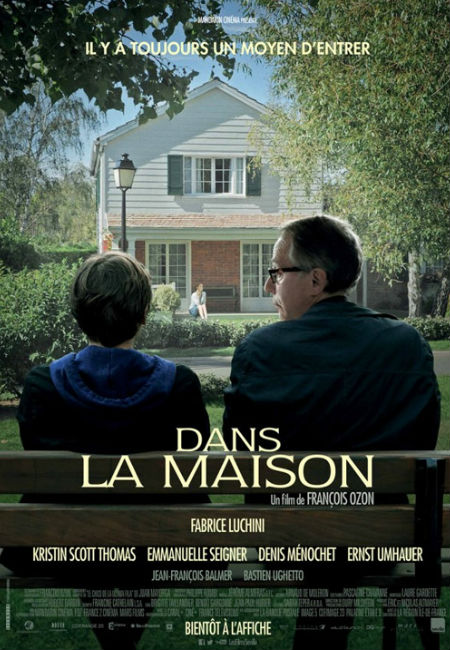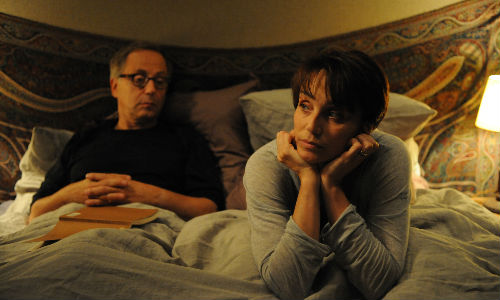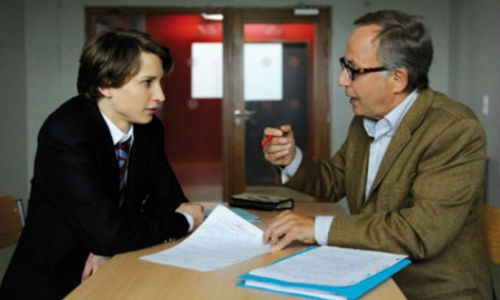
There are no real winners in François Ozon’s adaptation Juan Mayorga’s play The Boy in the Last Row, In the House (Dans la Maison).
Neither the student Claude Garcia (Ernst Umhauer), a 16 year old boy from the “wrong side of the tracks” desperately trying to acquire the family he doesn’t have, or the teacher Germain (Fabrice Luchini), a jaded veteran of the French school system anxious for anything or anyone that will shake up his scepticism-soaked ennui, emerge unscathed from this tautly-told tale of desires unfulfilled.
And it is not for lack of trying.
From the moment a clearly keen Claude presents his literature teacher Germain with an erudite, well told “What I did on the weekend” story about his insinuation into the home of Rapha Artole (Bastien Ughetto), and his parents Rapha senior (Denis Ménochet) and Esther (Emmanuelle Seigner), which stands in stark contrast to the limply unimaginative tales handed in by his classmates, there is an ever-escalating attempt by both parties to draw what they need from the other.

Claude for his part is handing in assignments at a prodigious rate, even getting in early in many cases, partly to impress Germain but also because he needs his weekends to concentrate on maths, the pretext he uses to get close to Rapha, a basketball-mad “affable” classmate who is struggling with trigonometry in particular, an area in which Claude excels.
And Germain, delighted to an almost pathetic extent to have a student that doesn’t talk about “cell phones” and “pizzas” as the lynchpins of their weekend activities, seizes on Claude’s almost-suffocating enthusiasm, encourages him to go further and further with his voyeuristic observations, under the pretext of coaching him in the craft of writing.
The innocent parties in all this – Rapha and his parents who are unaware they are effectively being stalked by a literary-wanne be sociopath, and Germain’s wife Jeanne (Kristin Scott Thomas) who is the curator and manager of an avant garde art gallery stocked with Nazi erotic skirt and sex dolls with the heads of dictators attached – are left sprawling in the wake of Claude and Germain’s dysfunctional teacher/student race to the bottom.

Not that Germain, a man in love with literature (although a failed writer himself) to the exclusion of almost everything else including his wife Jeanne, whose artistic interests are barely acknowledged by him, or Claude, who is so covetous of Rapha’s “perfect family” that he will do anything to be a part of it, would admit that their actions have any deleterious effects on anyone.
This is partly blindness to the ramifications of their weirdly co-dependent relationship, but also a self-serving need to paint their base motivations, of which they are both starkly aware, in the best possible light, at least to themselves if no one else.
Both are outsiders in their respective worlds – Germain is looked upon as an oddity by his colleagues while Claude is not really a part of the student body in any meaningful way – and need each other, irregardless of the lies they must feed themselves and the damaging effects on those around them.
That both characters somehow remain likeable throughout the film is testament to Mayorga’s literate base material, and Ozon’s masterful interpretation of a tale of people watching stretched to wholly unpalatable, if understandable, extremes.
And it is a tribute to both Umhauer and Luchini, who never resort to melodramatic cliches or overwrought acting, to get across the unhealthy aspects of their burgeoning relationship, of which there are many, that we are willing to watch two quite essentially unattractive people stumble their way to their respective, much-flawed and in the end, elusive “promised lands”.

It becomes readily apparent as the story goes on, a story by the way that is allowed to unfold quietly and naturally albeit with some imaginative flourishes by Ozon who inserts a critiquing Germain more than once into the scenes Claude describes to underline how much a part of his student’s bizarre mix of reality and fantasy he has become, that neither will truly gain what they want from their strangely-compelling shared endeavour.
That they persist with it anyway, regardless of the messy and enduring consequences that result, illustrates how deeply unsatisfied both are with the lives they are living.
In the House manages to remain a warm and engaging tale throughout, despite its dark subject matter, thanks largely to Ozon’s recognition that the heart of the story is essentially a sobering tale of two flawed people trying to complete each other through uncontrollable elements external to themselves, realising all too late that what they grasp will never truly be theirs to hold in the long term, if at all.
The fact that we’re unable to tell with absolute certainty by the end what is fact and what is fiction, speaks to the film’s central message that all of us are guilty of fusing the two at one point or another in an attempt to make our way through this messy, often disappointing thing we call life.